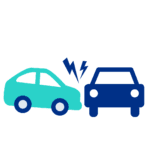
Car & Auto Insurance in Nova Scotia & PEI
The Road to Better Auto Insurance Coverage
Looking for the best car insurance rates in Halifax? You’ve come to the right place. With access to over 10 auto insurance markets, including auto insurance in Halifax, our brokers are equipped to find the most competitive offers year after year. We want you to feel confident your auto insurance coverage fits your needs.
Mandatory Car & Auto Insurance From Our Brokers In Nova Scotia
By law, you need to have Accident Benefits Coverage, Direct Compensation, Liability Coverage, and Uninsured and Unidentified Automobile Coverage.

Accidents Benefits
Regardless of who is at fault, this covers the cost of medical bills and other expenses.

Direct Compensation
Covers damages to your vehicle if you’re not at fault.

Liability Coverage
Covers injuries and damages you may cause when you drive your vehicle.

Uninsured and Unidentified
Medical costs and damage are covered if an uninsured driver is at fault.
Optional Extended Coverage For Nova Scotia
Go above the minimum protection and choose one of these options for your car:

Accident Forgiveness
This allows one ‘free’ at-fault or partially-at-fault accident, meaning your premiums won’t increase.

Comprehensive
All insured damage that is caused to your vehicle (except collision or upset) will be repaired/replaced.

All Perils
This combines Collision or Upset and Comprehensive coverage along with increased theft protection.

Specified Perils
Any losses resulting from events that are pre-defined in your policy such as fire, windstorm, or theft.

Collision or Upset
If there is damage to your vehicle in an at-fault accident, hit and run, or with an uninsured driver, it will be repaired/replaced.
How Does Car Insurance Work?
Whether you lease, finance, or own your car, you must have the mandatory car insurance coverage your province requires. However, certain conditions and restrictions apply.
You and all drivers you wish to include in the policy must have a valid driver’s license and be a resident of Canada. Insurance companies also look at your driving record. Other eligibility restrictions may arise such as your car. If your car has substantial unrepaired damage or is deemed unsafe an insurer may not want to issue you a policy.
Once you’ve personalized your auto insurance coverage with your insurance broker, you will pay an insurance premium. This premium will provide you financial protection against physical damage or bodily injury as a result of a collision. It will also cover liability costs if you ever injure someone or damage a vehicle while driving.

How Much Does Car Insurance Cost In Nova Scotia?
We look at several factors when calculating your auto insurance premium:
- Your car make, model, and year built are all taken into consideration when quoting. The kind of car you have determines its value, safety features, and the cost to repair any damages.
- How often you drive and the number of kilometers you drive every year.
- Your driving record, which includes things like the number of years you have been licensed for, accidents, and speeding tickets.
- The area you live in will affect your premiums – whether Halifax, Summerside, or elsewhere – and generally people living in large urban areas will have higher premiums.
- The coverage and add ons you choose might cost you more monthly, but can provide you with additional benefits that could save you thousands in the case of a claim.
- Cancellation for non-payment will result in higher premiums.
How Do I Save On Car & Auto Insurance In Nova Scotia?
Here are a few simple tips to save on car insurance in Nova Scotia:
- Bundle your car and home policy.
- Maintain a good driving record.
- Increase your deductible.
- Insure all your cars with the same insurance broker.
- Remove collision coverage if you drive an older vehicle.
- Consider driving a “low-risk” vehicle.
How Do I Get A Car & Auto Insurance Quote In Nova Scotia?
If you’re looking for an auto insurance quote in Nova Scotia or PEI, fill out our online form and one of our brokers will be in touch with a personalized quote. To get started, you’ll need your driver’s license and some basic information about your car.
Keep in mind the minimum car insurance coverage required is determined by the Government of Nova Scotia.
Car Insurance Coverage Options:
FAQ's
Every driver in Nova Scotia is legally required to have (1) Accident Benefits Coverage, (2) Direct Compensation, (3) Liability Coverage, and (4) Uninsured and Unidentified Automobile Coverage.
There is mandatory coverage that is regulated by the government of Nova Scotia. There is also optional extended coverage you can add to your policy, such as collision or comprehensive coverage. Every policy is different, so speak with your insurance broker to know the type of car insurance coverage you have and what is best for you.
Here are some examples:
Liability insurance coverage is mandatory in Nova Scotia. It protects you from being held personally responsible for damages and injuries to a third party or a third party’s property.
Another coverage that is mandatory in Nova Scotia is Accident Benefits coverage. It covers medical expenses, income replacement, and other benefits to help you recover from a car accident regardless of who is at fault.
Collision or Upset coverage takes care of damages in the event of a collision with another car or object, like a tree or pothole. It is not mandatory but most likely required if you are financing or leasing your vehicle.
Another optional extended coverage to add on to your policy is Comprehensive coverage. It covers damages or losses such as fire, theft, vandalism, or glass. Similar to Collision coverage, it is not mandatory but most likely required if you are financing or leasing your vehicle.
It depends! Your policy may cover your rental car if yours needs repairs in the case of an accident. Keep in mind your rental coverage does not cover the cost of gas, so there will still be some cost associated with your rental car. Speak with your insurance broker to find out what coverage you have.
In short, yes! One factor in determining your premium is how you use your car. For most drivers, the less you use your car, the less you pay. If you are no longer driving to work, call your insurance broker and let them know your usage has changed. This could save you some money.
The most important thing to note is your car insurance policy follows the car, not the person. In most cases, your friend can drive your car with your permission. They are borrowing your insurance and if an accident happens you are liable. This assumes you are still the primary driver of the vehicle, you are following the rules of your insurance policy, and that person can legally drive. There are other situations, however, where you may have to transfer vehicle insurance.
For example, if you change your car during the term of your car insurance policy, you need to let your insurance provider know. Almost all insurance providers allow you to transfer your policy from one car to another. Keep in mind your premium could go up, down, or stay the same depending on the type of car you buy.
Car insurance does not cover the cost of wear and tear or routine maintenance to your car. There are optional extended add-on coverages that will pay for repairs/damages to your car as a result of an accident or natural disaster.
Yes. You must declare all individuals in your household with a full license. If your child does not have their own car and car insurance, you will have to list them on your policy as a secondary or occasional driver.
